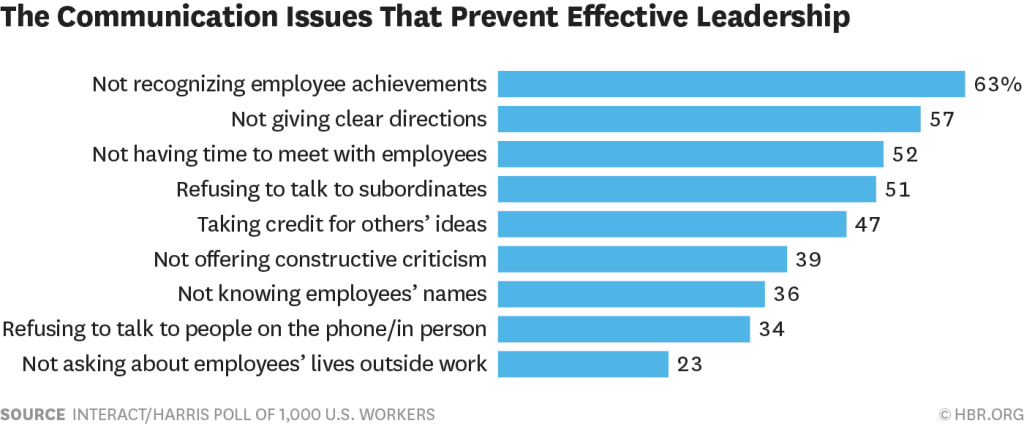Want better management skills? These communication tips will come in handy and make you a better manager.
Why Communication Matters
Poor communication is a huge problem – in fact, it’s one of the top reasons people quit their jobs and leave relationships.
Don’t allow poor communication to destroy your team or make your management less effective.
Having great communication in the workplace is important because it:
- Makes employees more likely to cooperate with one another harmoniously
- Increases productivity
- Helps you solve problems and reach goals more efficiently
- Helps your team to trust each other more
- Makes your employees feel valued and secure
- Decreases absenteeism and turnover rates
The better a manager can communicate with other employees, the better the business will run overall.
Communication Skills That Help Make Better Management
Effective leaders typically have the following qualities:
- positive attitude
- empathy
- accountability
- honesty and integrity
- patience
- goal-oriented
- great communicator
Communication is key to being an effective leader in the workplace. This is why companies with better management are encouraging managers to work on their communication skills all the time.
Research shows that many of us need to hear a message multiple times before we get it. Communication isn’t something you can check off a to-do list.
Your managers should be consistently working on their communication skills in order to become better managers.
Read on below to learn the top 4 communication tips that make better management.
4 – A Good Manager Is Humble
A good leader does not demand respect; they earn it. The Golden Rule shines here:
Treat others as they want to be treated.
You should treat your other employees with respect at all times.
A good leader is not condescending when speaking to their subordinates. Make sure you’re not talking down to your team members, but rather treating them with respect.
They, too, have worked hard to get where they are. They, too, are busy with tasks throughout the day. Make sure you are respectful of their time, too!
If you treat your team with respect, they will respect you in return.
3 – A Good Manager Gives Feedback and Listens
Don’t just manage your team; lead them!
What’s the difference between management and leadership?
Managers simply manage resources, but leaders help their team members grow.
Your employees should understand what is expected of them, what their goals are, and how they are doing. They should understand that you’re invested in their personal growth as well as the company’s.
While performance reviews are a great way to discuss performance with employees, a manager should supplement that with consistent feedback.
So how do you give feedback to help your employees grow?
- Recognize their achievements and successes
- Give timely feedback
- Offer support for any task they’re having trouble with
- Give clear directions from the beginning and clarify when necessary
- Check for understanding after explaining something
- Listen to your employees when they have concerns or questions
 2 – A Good Manager Is Supportive & Empathetic
2 – A Good Manager Is Supportive & Empathetic
When addressing a problem in the workplace, it’s important to tackle it with empathy rather than anger.
For example, if your coworker, Bob, keeps showing up to work late, how should you handle it?
- A) Pull him into your office and yell at him
- B) Calmly sit down with him one on one and discuss the matter
- C) Fire him
The correct answer here is B. While it may be tempting to choose A or C, those choices can end up causing more problems and even lead to resentment from other employees. You want your team to trust you.
Sit down with Bob and clearly state the problem: “You are consistently late and have been for X weeks.”
State why this problem concerns you: “I am concerned that the lost time is negatively affecting productivity.”
Remember to be empathetic. You are part of team, and you can work together to solve this problem.
Offer some support: “How can I help you solve this problem?”
It’s important to come at the issue with an attitude of “How can I help?” instead of blame and anger.
 1 – A Good Manager Sets Clear Goals
1 – A Good Manager Sets Clear Goals
A good manager is able to articulate their thoughts clearly and concisely.
The biggest goal of any manager is to oversee the operations of their team and help them reach goals. This is achieved through clear communication about goals and objectives.
Managers must plan accordingly for upcoming milestones and always think ten steps ahead.
Here’s how you can practice setting clear goals:
- Get to know your employees and their communication styles
- Don’t just “wing it” – come up with a script when discussing objectives
- Have a backup plan ready
- Be prepared to explain any aspect of your plan
- Break down your plan into small, easily understandable pieces
- Double-check that everyone is on the same page throughout the project
Get Better Management with Kinsey Management!
Kinsey is a management consulting firm and Certified Predictive Index (PI) Partner. We support leaders, tackle the big questions, and strengthen an organization’s people capabilities to achieve its key objectives. Contact us today!
4 Communication Tips for Better Management | Kinsey Management – Houston, TX



